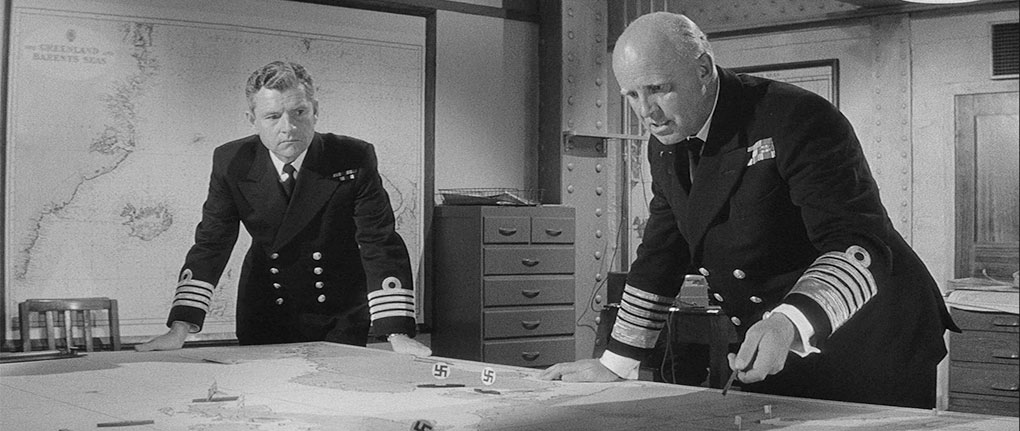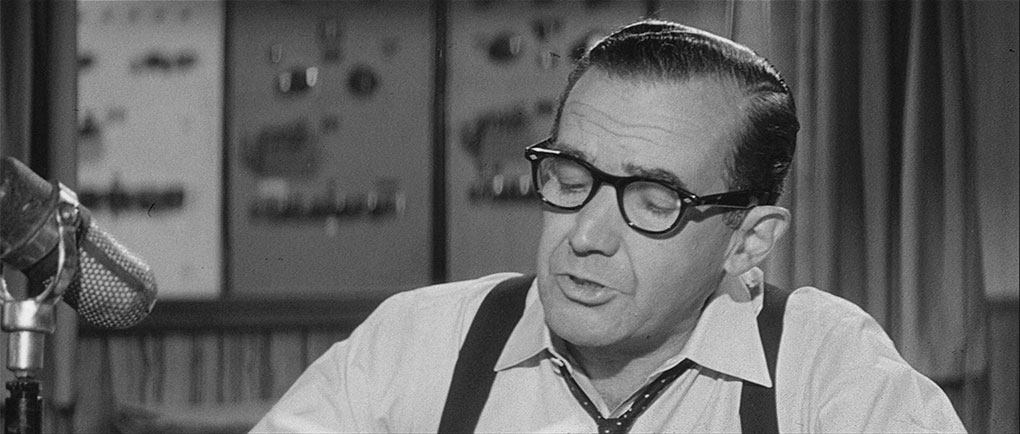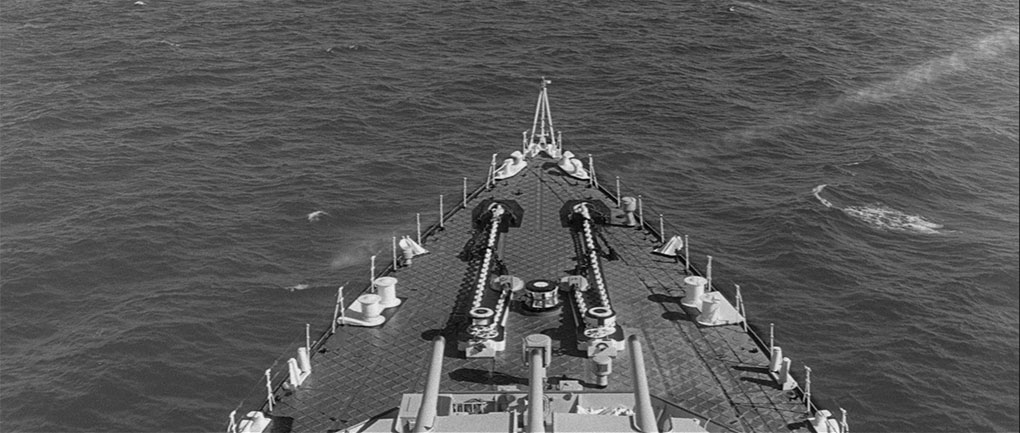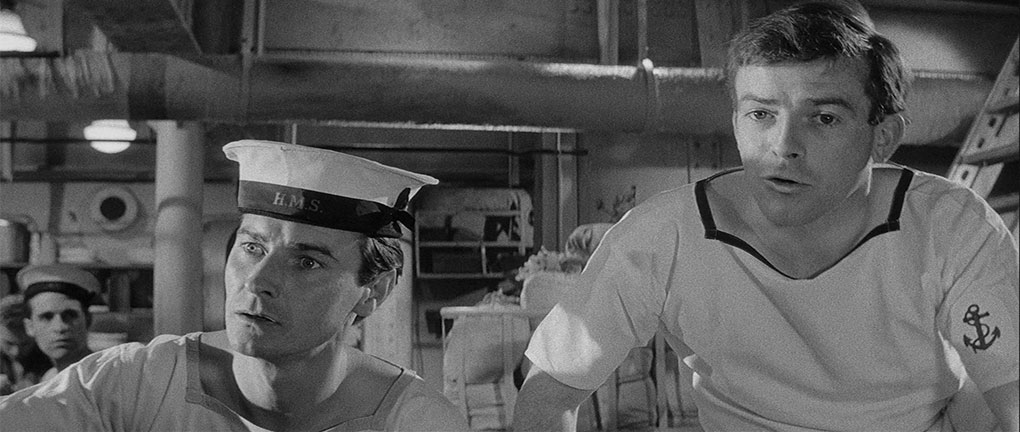|
I first became aware of the 1960 British war movie Sink the Bismarck! – one of those rare non-exploitation film titles that sport an exclamation mark – via a very different and considerably cheaper production that due to unfortunate circumstances (oh, let's be honest and call it stupidity) was never completed. My closest friend at film school was in his second year and was given a class assignment to write and direct a three-camera TV drama or news programme. He chose drama and really went for it, building sets, buying costumes at second-hand stores and going out of his way to find the right faces for the parts he had written. The piece was designed to be a parody of old-school British war movies and was titled Sink the Bismarck 2, which comically suggested that the justifiably feared German battleship The Bismarck had somehow risen from the sunken depths to have a second stab at its British persuers. What I saw of the production was pretty bloody funny – my friend had a very real and rare knack for comedy – and all was going well until he returned after a week's break to continue shooting, only to discover that one of his fellow students had somehow mistaken his clearly labelled video tapes for blank ones and recorded over almost all of his painstakingly captured footage. It may cheer you a little to learn that my friend made this idiotic vandal's life hell for several months to come.
Sink the Bismarck! is in many ways typical of British post-WW2 movies about the Second World War, from its factual source material and focus on the actions and personal lives of the officer class to a cast liberally peppered with familiar faces and what feels like a very British downplaying of heroics or triumphant jingoism. It's this last aspect that for me has always been key to the appeal of such films, an acceptance that in war there is a human cost to even the most successful campaign, one that grounds the best of these films in reality and makes it possible to appreciate the audacity of military action and the bravery of individuals without being asked to salute the flag and shed an artificially sentimental tear.

Scripted by The Day the Earth Stood Still screenwriter Edmund H. North from a novel and uncredited script by Hornblower and The African Queen author C.S. Forester, Sink the Bismarck! has ambitious foundations, as in order to be (reasonably) true to history, the film has to hop between a number of ships and the command centre in London and ensure that we are able to keep track of who is who and what their role is in the unfolding story at all times. Central to the narrative is Captain Jonathan Shepard (Kenneth Moore), a stoic officer and a stickler for discipline who during the early days of the Second World War is tasked with overseeing the hunting down and sinking of The Bismarck, a fearsome new German battleship with the potential to outgun any naval vessel sent up against it.
Though we often have to allow for poetic licence when judging films based on fact, much of what is depicted here is apparently on the nose, and the circumstances and technical limitations of the period in which the story takes place ensure that the task in question proves a tense and exciting one. Living as we do in a time when every ship and aircraft can be constantly tracked and a vessel requires the assistance of special technology to avoid showing up on enemy radar, it's easy to forget that during WW2 a ship could be effectively invisible until it was in physical proximity of another. To pinpoint the location of a specific vessel required experience, intelligence reports and a sometimes healthy dose of educated guesswork, and it was the last of these that was central to my friend's intended parody. Little did he know that this was one of Sink the Bismarck!'s few notable inaccuracies, albeit one that the filmmakers themselves would have been unaware of back in 1960 – the bold hunch that locates the Bismarck after it has soundly bested its pursuers was actually supported by intelligence supplied by the now celebrated code-breakers at Bletchley Park, information that was not declassified until 1975. Other small changes made to the continuity and timeline of actual events were doubtless made to facilitate the compression of a story of this scale into a tightly constructed 97 minutes of screen time. The decision to portray German Admiral Günther Lütjens as an enthusiastic Nazi in awe of the führer has come in for some criticism over the years, as the real-life Lütjens was not a supporter of Nazi policies, was openly critical of the party's antisemitism and refused to give the expected Nazi salute when Hitler visited the Bismarck before its inaugural mission. Indeed, it would appear that when it comes to their personalities, the film version of Lütjens has swapped places with Bismarck Captain Ernst Lindemann, a more zealous officer who here is portrayed as the German voice of reason. In this disc's special features, Sheldon Hall gives a plausible explanation for this personality switch, but this is one case where sticking to the facts could have made the portrayal of Lütjens more layered and interesting in the manner of Captain Hans Langsdorff in Powell and Pressburger's The Battle of the River Plate.

Soundly countering this, however, is an impressive overriding historical accuracy and an almost fastidious attention to detail, which extends to the casting of Esmond Knight as the Captain of The Prince of Wales, a ship on which the actor served as a gunnery officer and on which he was seriously injured during the very battle with the Bismarck depicted here. Adding further to the air of authenticity are radio broadcasts delivered on camera by respected real-life war correspondent Edward R. Murrow, later the host of the popular TV show See it Now, where his deeply principled stand against the actions of Senator Joseph McCarthy helped to bring about the end of the Hollywood blacklist, events recreated in George Clooney's Good Night, and Good Luck. This aside, the film does not overly demonise the Germans, respecting the engineering feat that was the Bismarck and acknowledging the professionalism of its crew, whose suffering when their own ship takes damage is not shied away from.
A cast comprised of so many familiar faces also has its purpose here, aiding quick recognition of specific characters as the story darts between the staff of the busy command centre and various naval officers on multiple ships. Where it counts, the casting is absolutely spot-on. Kenneth Moore was an actor equally adept at serious drama and comedy, and while he initially plays Shepard as a man devoid of emotion and sentiment (traits for which Shephard has been specifically chosen for the job, we are informed), his gradual and subtle warming to those around him is most effectively conveyed and makes the one brief sequence in which he gives in to his emotions all the more impactful. He receives fine support from the likes of Laurence Naismith, Maurice Denham, Geoffrey Keen, Michael Hordern and Ernest Clark, and especially Dana Wynter as Second Officer Anne Davis, a seasoned professional who takes Shepard's no-nonsense approach in her stride and quickly proves to be the perfect assistant for him.
As with The Battle of the River Plate, the production was able to enlist the assistance of the Royal Navy and use actual ships instead of mocked-up sets for a number of key sequences, which adds to the sometime documentary feel, although the studio interiors are also convincingly done. A tad less seamless is the incorporation of wartime naval footage, which has been enlarged to fill the film's 2.35:1 frame and is noticeably grainier and softer in its detail, something especially evident on such a pristine HD transfer. What really surprises is the quality of the model work and how well it still stands up – indeed, so convincing is it at times that I often had trouble differentiating between the real ships and the scaled-down imitations and crucially tended to give the matter no thought, so absorbed did I become in the story and the action.

Sink the Bismarck! is the sort of war movie that British cinema once excelled at, telling as it does an involving and intermittently exciting true story without sensationalising or over-dramatising events or characters. Director Lewis Gilbert had by this point already proved a dab hand at compellingly told wartime dramas with the likes of Albert, R.N. (1953), The Sea Shall Not Have Them (1954) and Reach for the Sky (1956, also with Kenneth Moore), and would later helm one of my personal favourites in the riveting 1975 Operation: Daybreak. Here he directs with an almost invisible hand, his skill lying in his ability to move so freely between locations and characters without losing or confusing his audience for a second. He may also be responsible for the first on-screen use of a particular swear word in mainstream western cinema, when British pilots mistake one of their own ships for the Bismarck and launch a nearly disastrous attack and the ship's captain angrily mutters – inaudibly but still distinctly in close-up – "Stupid fucking bastards!"
A pristine 1080p transfer from a top-notch restoration that gets everything right. The image is sharp and detail distinct, the contrast is gorgeously pitched with crisp black levels and good shadow detail, a fine film grain is visible and only the very occasional small dust spot remains. As noted above, this does mean the stock footage, which is softer and sporting coarser grain, often (though not always) stands out a mile.
We have two options here, the original mono soundtrack in Linear PCM 2.0 and a stereo track, also Linear PCM 2.0, and frankly there's not a huge difference between them. Both are clear with the expected restrictions in the dynamic range (no subwoofer-rattling explosions here) and while I didn't detect any serious separation on the stereo track, it does have just a tad more breadth and punch to it than the mono original.
Optional subtitles for the deaf and hearing impaired are available.
Sheldon Hall on Sink the Bismarck! (34:06)
Film historian Sheldon Hall provides a typically thorough look at the film and its making, discussing how the project came about, how the filmmakers secured naval cooperation, the function of the (fictional) character of Shephard in the drama, the fact that the various antagonists and protagonists never meet each other, the portrayal of the German characters, the film's historical accuracy, and a good deal more.

Theatrical Trailer (3:02)
I'm guessing this is the original American trailer, judging by the voiceover and the song. Yes, there's a song, one that frankly sounds as if it's been cribbed from a low-budget cavalry western and had the lyrics hastily rewritten by someone with no knowledge of the concept of making lines rhyme: "We've got to sink the Bismarck to the bottom of the sea. They find the German battleship that's making such a fuss." A fuss? Ask the survivors of the Bismarck's attack on HMS Hood if they thought it was making "a fuss."
One of a string of excellent British war films made in the long wake of WW2, Sink the Bismarck! is a gripping blend of cat-and-mouse tension, explosive action and very British (and I mean that in a good way) low-key character drama. This Eureka Classic Blu-ray may be a little short on special features, but the key one that is there is of a high quality and the transfer alone makes this disc worth buying. Enthusiastically recommended.
|